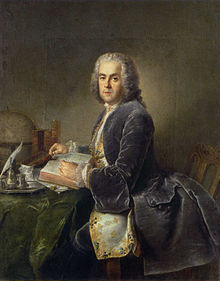Charles Etienne Jordan
Charles Étienne Jordan (born August 27, 1700 in Berlin ; † May 13, 1745 , Germanized Carl Stephan Jordan ) was an advisor and close confidante of Frederick the Great in the early days of the Enlightenment .
Life
Jordan was the third-born son of a family of southeast French Huguenots from the Dauphiné who immigrated to Berlin . At the request of his father, he first studied theology in Magdeburg and then in Geneva and Lausanne (1719–1721) and then took over pastoral positions in Potzlow in the Uckermark (1724–1727) and in Prenzlau (1727–1732). During these years he published, among other things, a Latin study on Giordano Bruno and a collection of writings on literature, philosophy and history.
After the death of his wife Susanne geb. Perrault († 1732), with whom he had been married since 1727 and had two daughters, he gave up his ministerial office and settled in Berlin. From there he went on educational trips to France, England and Holland, where the ideas of the Enlightenment were developed. Here he established relationships with local scholars, of which his Histoire d'un voyage littéraire, fait en 1733 (The Hague 1735) reports. For about a year he worked as an educator for Baron Knyphausen in Frankfurt an der Oder .
At the mediation of the former Saxon minister Ernst Christoph von Manteuffel , the then Crown Prince Friedrich called him to Rheinsberg in 1736 and made him his librarian and secretary. A close relationship of trust soon developed between the two of them. One of Jordan's tasks was to correct the Crown Prince's French correspondence and writings, and he also made the French translation of a text by the enlightener Christian Wolff, who was valued by Friedrich . When Friedrich, who was admitted to the Freemasons ' League in Braunschweig in 1738 , founded his own court lodge in Rheinsberg in 1739 ( Loge première , then Loge du Roi ), from which in 1740 the StadtLoge Aux trois Globes ( “To the three globes ” ), Jordan was one of the first members, along with some nobles from the Crown Prince's closest circle of friends.
During his activity at Friedrich's court, Jordan also continued his own scholarly studies. At his request, Friedrich acquired for him the correspondence of the Benedictine Maturin Veyssière de La Croze (1661–1739), who had converted to Protestantism , whom Jordan knew personally and regarded as a kind of teacher. Jordan began a biography of La Crozes in Rheinsberg, published an overview of the letters ( Conspectus thesauri epistoloci Lacroziani , Berlin 1741) and had the text of the letters published by Johann Ludwig Uhl (1714–1790) (Leipzig 1742–46, 3 vols. ).
In 1740 Jordan became the curator of all Prussian universities and supervisor of the orphanages and hospitals in Berlin. He set up a workhouse in Berlin for around a thousand unemployed and beggars, divided the city into police stations based on the Parisian model to improve security, and also improved transport by introducing the cab system. In 1744 the king appointed him vice-president of the renewed Academy of Sciences , but because of his untimely death he could no longer develop much effect in this office.
Individual evidence
- ^ Disquisitio historico-literaria de Jordano Bruno Nolano , Prenzlau 1726.
- ↑ Recueil de littérature, de philosophie et d'histoire , Amsterdam 1730.
- ↑ Histoire de la vie et des ouvrages de Mr. La Croze , 2 parts, Amsterdam 1741. (French)
literature
- Jens Häseler: A Wanderer Between Worlds: Charles Etienne Jordan (1700-1745) . (= Supplement to Francia , 28). Thorbecke, Sigmaringen 1993, ISBN 3-7995-7328-3 ( online )
- Theodor Hirsch : Jordan, Charles Etienne . In: Allgemeine Deutsche Biographie (ADB). Volume 14, Duncker & Humblot, Leipzig 1881, pp. 504-506.
- Gustav von Jordan, Louis von Jordan: Chronicle of the Jordan family. Berlin 1902
- Charles Étienne Jordan Histoire de la vie et des ouvrages de Mr. La Croze Biography of Maturin Veyssière de La Croze (French).
- Gerhard Knoll : Jordan, Charles Etienne. In: New German Biography (NDB). Volume 10, Duncker & Humblot, Berlin 1974, ISBN 3-428-00191-5 , p. 599 f. ( Digitized version ).
Web links
- Friedrich II .: Éloge de Monsieur Jordan , in: Histoire de l'Académie Royale des Sciences et des Belles-Lettres de Berlin, 1746, Haude, Berlin 1748, pp. 463–464
- Literature by and about Charles Étienne Jordan in the catalog of the German National Library
| personal data | |
|---|---|
| SURNAME | Jordan, Charles Etienne |
| ALTERNATIVE NAMES | Jordan, Carl Stephan (German name) |
| BRIEF DESCRIPTION | Preacher, scholar, advisor to Frederick the Great , Freemason |
| DATE OF BIRTH | August 27, 1700 |
| PLACE OF BIRTH | Berlin |
| DATE OF DEATH | May 13, 1745 |


